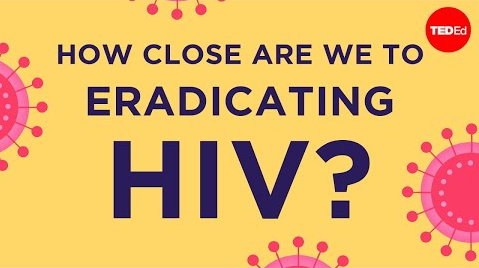(单词翻译:单击)
The world is getting closer to achieving one of the most important public health goals of our time: eradicating HIV.
世界正越来越接近实现当代最重要的公共卫生目标之一:消灭艾滋病毒HIV。
And to do this, we won't even have to cure the disease.
要做到这一点,我们其实不必治愈这种疾病。
We simply have to stop HIV from being transmitted until eventually it fizzles out.
只需阻断艾滋病毒的传播、直到它最终消失即可。
Once, this goal would have seemed impossible.
曾几何时,该目标显得遥不可及。
HIV has caused millions of deaths and is one of the most devastating diseases that humanity has ever known.
艾滋病已造成数百万人死亡,它是人类已知的、最具破坏性的疾病之一。
But we're now at a point where new advances such as one-pill, once-a-day medications are helping us tackle HIV in effective ways.
但我们现在已取得最新进展,如每日1次、每次1粒的药物治疗方案,正帮助我们有效解决艾滋病毒问题。
HIV is a retrovirus -- meaning it integrates copies of itself into an infected cell's DNA, allowing it to replicate and infect other cells.
艾滋病毒是一种逆转录病毒--即病毒能把自身整合复制到被感染细胞的DNA中,实现自我复制并感染其他细胞。
HIV has evolved numerous ways to evade the human immune system, which makes it difficult to cure.
艾滋病毒已进化出很多避开人体免疫系统的方法,使得它难以治愈。
But by developing ways to block HIV replication, we can stop the spread of HIV itself.
但通过研发阻断艾滋病毒复制的方法,我们可以阻止艾滋病毒的自身传播。
That's where antiretrovirals -- a.k.a. ARVs -- come in.
抗逆转录病毒药物,a.k.a.,ARVs就应运而生。
ARVs are a group of drugs which work in different ways to combat HIV.
抗逆转录病毒药物是一组以不同方式对抗HIV病毒的药物。
Some block HIV's access into immune cells, and others work by stopping the virus itself from replicating.
有些药物能阻断HIV进入免疫细胞,而另一些则能阻止HIV病毒的自我复制。
ARVs also work preventatively in people who don't have HIV.
抗逆转录病毒药物也可用于未感染HIV人群的预防性治疗,
This type of approach is called pre-exposure prophylaxis, or PrEP.
该方法称为暴露前预防,即PrEP。
PrEP works by accumulating in a person's body and preventing HIV from establishing itself.
PrEP的工作原理是,通过在人体内聚集阻断药物,防止HIV病毒在体内的建立。
That means an HIV-negative person who may be at risk of contracting the disease can take certain ARVs to protect themselves, before they become exposed.
这意味着HIV病毒呈阴性者,在接触HIV病原体之前,可服用某些抗逆转录病毒来保护自己。
Here's where it gets especially interesting: In people with HIV, ARVs can also dramatically reduce HIV transmission.
特别有趣的是:抗逆转录病毒药物也能极大降低艾滋病患者对HIV的传播。

This is called "Treatment as Prevention." On a global scale, this has the potential to end the HIV epidemic.
这称为“预防性治疗”,它可能在全球范围内终结艾滋病毒的流行。
It's based on the idea that someone with HIV who takes ARV's can lower the virus level in their bodies until it becomes undetectable.
该想法是基于感染者服用抗逆转录病毒药物后,会降低体内的HIV病毒水平,直至检测不到。
That doesn't mean the virus is gone; it could still be lurking within cells, ready to reactivate if treatment stops.
但这并非意味着病毒消失了;它依然潜伏在细胞内,如果停止服用药物,还会反扑。
But so long as it's kept dormant with drugs, HIV remains undetectable.
但只要药物控制能令病毒蛰伏在体内,就检测不出HIV病毒。
And when HIV is undetectable, it's untransmittable, too.
只要检测不出HIV病毒,它就没有传播性。
In theory this means that by testing everyone who's at risk of HIV and treating those who test positive,
理论上来说,只要对HIV高危人群进行检测,并对HIV阳性患者进行药物治疗,
we could stop transmission and eventually eradicate HIV.
我们就可以阻断病毒传播,并最终灭艾滋病毒HIV。
In the real world, however, things are more complex.
然而,现实生活中,情况则更加复杂。
Many at-risk HIV negative people across the world do not have access to PrEP or ARVs,
世界各地许多处于危险中的艾滋病毒呈阴性的人,无法获得暴露前预防或抗逆转录病毒药物,
and those who are HIV positive may experience challenges to taking ARVs.
而艾滋病毒感染者也面临服用抗逆转录病毒药的挑战。
These problems are often greatest in countries where the burden of HIV is highest.
在艾滋病毒负担最高的国家,这些问题往往最为严重。
Getting these medications depends on access to a functioning healthcare system -- and this isn't something everyone has.
获得这些药物取决于能否获得有效的医疗保健系统--而这并非人人都有。
That's part of the reason why stopping the spread of HIV for good will require a significant investment of resources to improve those systems.
这就是为什么永远阻止艾滋病毒的传播,需要投入大量资源来改善这些系统的原因。
One study carried out by the UNAIDS estimated that between 20-30 billion dollars per year
据联合国艾滋病规划署开展的一项研究估计,到2030年,每年需投入200-300亿美元,
would be needed to achieve a nearly 90% reduction in new HIV infections by 2030.
才能使艾滋病新感染率降低近90%。
This investment would ensure more people would get tested in the first place, and more would be able to access and maintain treatment.
这项投资将确保更多人首先接受测试,并且让更多人能获得和维持药物治疗。
Achieving this goal and improving healthcare in general is in everyone's best interest, from individual people to society as a whole.
从个人到整个社会,实现这一目标并改善整体医疗服务,符合每个人的最佳利益。
We have roadmaps that could allow us to bring the HIV epidemic to an end in the near future,
我们的发展蓝图是,在不久的将来阻断艾滋病毒的流行,
with the possibility of eradicating the disease altogether several generations in the future.
并有可能在未来几代人中彻底消灭艾滋病。
In the period from 1996 to 2017 we almost halved the number of new HIV infections,
在1996年至2017年期间,新的艾滋病毒感染人数几乎下降了一半,
and for the millions of people who still live with the virus, ARV treatments enable most to lead long and healthy lives.
对于数百万感染了艾滋病毒的人来说,抗逆转录病毒疗法使多数人能够过上长寿和健康的生活。
With continued and increased investments, we can get transmission rates low enough to end HIV once and for all.
随着持续和增加的投资,我们可以将HIV传播率降低到足以彻底消灭它。
A world without HIV is no longer inconceivable: it's closer than ever.
没有艾滋病毒的世界不再只是奢望:离实现它只有一步之遥。


